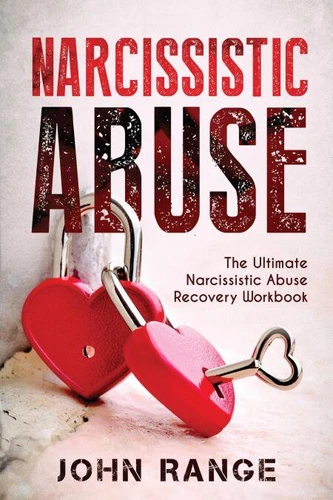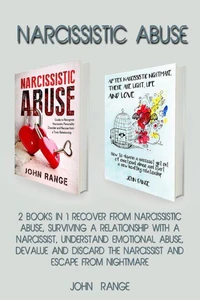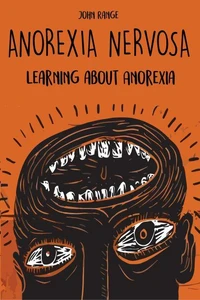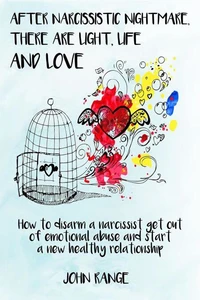Narcissistic Abuse The Ultimate Narcissistic Abuse Recovery Workbook
Par :Formats :
Disponible dans votre compte client Decitre ou Furet du Nord dès validation de votre commande. Le format ePub est :
- Compatible avec une lecture sur My Vivlio (smartphone, tablette, ordinateur)
- Compatible avec une lecture sur liseuses Vivlio
- Pour les liseuses autres que Vivlio, vous devez utiliser le logiciel Adobe Digital Edition. Non compatible avec la lecture sur les liseuses Kindle, Remarkable et Sony
 , qui est-ce ?
, qui est-ce ?Notre partenaire de plateforme de lecture numérique où vous retrouverez l'ensemble de vos ebooks gratuitement
Pour en savoir plus sur nos ebooks, consultez notre aide en ligne ici
- FormatePub
- ISBN8201979638
- EAN9798201979638
- Date de parution19/09/2021
- Protection num.pas de protection
- Infos supplémentairesepub
- ÉditeurJL
Résumé
People with a narcissistic personality disorder often seem to not really love themselves. Actually, they're driven by shame. It's the idealized image of themselves, which they convince themselves they embody, that they admire. But deep down, narcissists and people with NPD feel the gap between the façade they show the world and their shame-based self. They work hard to avoid feeling that shame. This gap is true for other codependents, but a narcissist uses defense mechanisms that are destructive to relationships and cause pain and damage to their loved ones' self-esteem.
Some narcissists' coping mechanisms can be abusive - hence the term "narcissistic abuse." However, someone can be abusive, but not be a narcissist. Addicts and people with other mental illnesses, such as bipolar disorder, antisocial personality disorder (sociopathy), and borderline personality disorders, are abusive. So are many codependents without a mental illness? Abuse is abuse, no matter the abuser's diagnosis.
Suppose you're in a relationship with a narcissist. In that case, it's essential to get outside support to understand clearly what's going on, to rebuild your self-esteem and confidence, and to learn to communicate effectively and set boundaries. This book will help you to make changes. If you feel in danger, don't believe in broken promises. Get immediate help, and read "NARCISSISTIC ABUSE - The Ultimate Narcissistic Abuse Recovery Workbook."
Some narcissists' coping mechanisms can be abusive - hence the term "narcissistic abuse." However, someone can be abusive, but not be a narcissist. Addicts and people with other mental illnesses, such as bipolar disorder, antisocial personality disorder (sociopathy), and borderline personality disorders, are abusive. So are many codependents without a mental illness? Abuse is abuse, no matter the abuser's diagnosis.
Suppose you're in a relationship with a narcissist. In that case, it's essential to get outside support to understand clearly what's going on, to rebuild your self-esteem and confidence, and to learn to communicate effectively and set boundaries. This book will help you to make changes. If you feel in danger, don't believe in broken promises. Get immediate help, and read "NARCISSISTIC ABUSE - The Ultimate Narcissistic Abuse Recovery Workbook."
People with a narcissistic personality disorder often seem to not really love themselves. Actually, they're driven by shame. It's the idealized image of themselves, which they convince themselves they embody, that they admire. But deep down, narcissists and people with NPD feel the gap between the façade they show the world and their shame-based self. They work hard to avoid feeling that shame. This gap is true for other codependents, but a narcissist uses defense mechanisms that are destructive to relationships and cause pain and damage to their loved ones' self-esteem.
Some narcissists' coping mechanisms can be abusive - hence the term "narcissistic abuse." However, someone can be abusive, but not be a narcissist. Addicts and people with other mental illnesses, such as bipolar disorder, antisocial personality disorder (sociopathy), and borderline personality disorders, are abusive. So are many codependents without a mental illness? Abuse is abuse, no matter the abuser's diagnosis.
Suppose you're in a relationship with a narcissist. In that case, it's essential to get outside support to understand clearly what's going on, to rebuild your self-esteem and confidence, and to learn to communicate effectively and set boundaries. This book will help you to make changes. If you feel in danger, don't believe in broken promises. Get immediate help, and read "NARCISSISTIC ABUSE - The Ultimate Narcissistic Abuse Recovery Workbook."
Some narcissists' coping mechanisms can be abusive - hence the term "narcissistic abuse." However, someone can be abusive, but not be a narcissist. Addicts and people with other mental illnesses, such as bipolar disorder, antisocial personality disorder (sociopathy), and borderline personality disorders, are abusive. So are many codependents without a mental illness? Abuse is abuse, no matter the abuser's diagnosis.
Suppose you're in a relationship with a narcissist. In that case, it's essential to get outside support to understand clearly what's going on, to rebuild your self-esteem and confidence, and to learn to communicate effectively and set boundaries. This book will help you to make changes. If you feel in danger, don't believe in broken promises. Get immediate help, and read "NARCISSISTIC ABUSE - The Ultimate Narcissistic Abuse Recovery Workbook."








